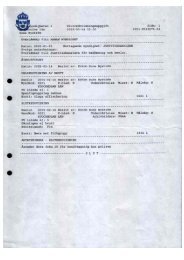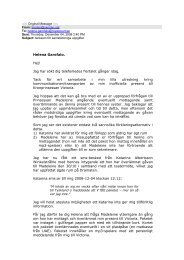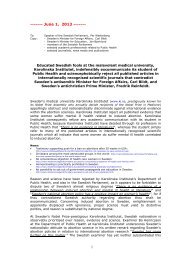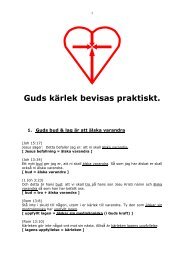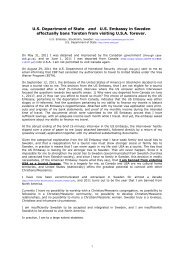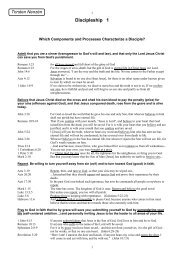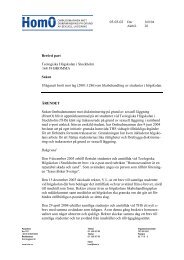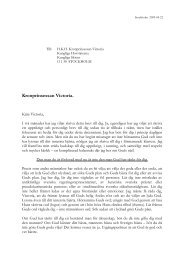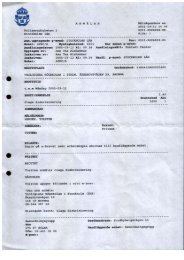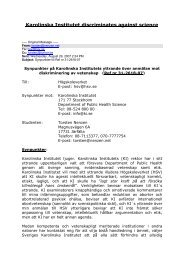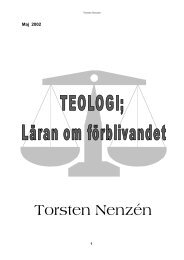THS heretical theology - Torsten Nenzen
THS heretical theology - Torsten Nenzen
THS heretical theology - Torsten Nenzen
Create successful ePaper yourself
Turn your PDF publications into a flip-book with our unique Google optimized e-Paper software.
1<br />
Brev till <strong>THS</strong> Studentkår (som ej besvarats)<br />
Ärende till S<strong>THS</strong> studentrepresentant för nätkurser.<br />
Hej!<br />
Jag önskar att S<strong>THS</strong>, kanske i samband med studentkårens årsmöte, företräder<br />
studenternas och sanningens intresse med avseende på grundkursen i GT Exegetik.<br />
Det är min åsikt att kurslitteraturen ”Understanding the Bible” av Stephen Harris<br />
avviker ifrån klassisk kristendom, samt att <strong>THS</strong> kursansvarig otillräckligt möter<br />
högskolans krav på vetenskaplighet och intellektuell integritet. Jag vill samtidigt<br />
understryka att mitt ärende, med bifogad information, ändå bör behandlas med<br />
personlig respekt för kursansvarige.<br />
Kursansvarig inleder Närforum med följande ordalydelse: "När det gäller kontakten<br />
med mig, vill jag att den uppehålls här i kursens forum och inte via vanlig epost. På<br />
så sätt blir all information genast tillgänglig för alla kursens deltagare." Det visar sig<br />
senare att denna avsikt möjligtvis var tunt förankrad.<br />
Jag föreslår följande:<br />
1) Kurslitteraturen Stephen Harris skall utebli och ersättas av annan litteratur, som<br />
bättre motsvarar vetenskapliga kriterier med balanserad tro.<br />
Bifogar underlag.<br />
Vänligen,<br />
<strong>Torsten</strong> Nenzén<br />
1
2<br />
Akademisk dialog med kursansvarig vid<br />
Teologiska Högskolan i Stockholm<br />
From: Åke Viberg [ake.viberg@ths.se]<br />
Sent: den 18 mars 2004 13:12<br />
To: info@glocalnet.de<br />
Subject: Re: ang inlägg<br />
<strong>Torsten</strong>,<br />
Mitt förslag kvarstår. Lägg in ca 5 frågor så ska jag försöka svara på dem,<br />
Vänligen, Åke Viberg<br />
-------------------------------------------------------------------------------------<br />
Åke Viberg, docent lektor, exegetisk teologi, Gamla testamentet<br />
tel 08-56435718 Teologiska Högskolan, Stockholm<br />
ake.viberg@ths.se http://www.ths.se<br />
-------------------------------------------------------------------------------------<br />
2004-03-18 kl. 10.58 skrev GLOCALNET.de:<br />
Åke Viberg.<br />
Godmorgon, och tackar för din samarbetsvilliga respons. Som du kanske redan anar,<br />
värdesätter jag ärlighet, äkthet, öppenhet och sanning. Med osanningen kan jag aldrig<br />
kompromissa. Det innebär dock inte att erkända misstag ej kan kompromissas. Den<br />
relativistiska sanningen kan endast betraktas som relativt sann så länge som den inte är<br />
motbevisad. När meningsskillnader uppstår kring uppfattning om sanning, är den enda<br />
förutsättningen till förnuftets samförtstånd eller respekterad meningsskillnad att argumentera<br />
för sin mening. Avsaknad av argumentation omöjliggör förnuftets samförstånd eller<br />
respekterad meningsskillnad. Förutsättningen för argumentation är givetvis att argumenten<br />
kommuniceras. En bruten kommunikation omöjliggör därför förutsättningen till respekt, eller<br />
till samförstånd.<br />
I de mer intellektuella sammanhangen, vilket bl a högskolor och universitet utgör, måste,<br />
utifrån gemensamma definitioner, finnas enande kring argumentationen för fastställandet av<br />
teorier kring sanning respektive icke-sanning. Förutsättningen till kompromiss är enande<br />
kring argumentationens hållbarhet, även om argumenten i sig skiljer sig. Vi behöver alltså<br />
inte tro samma sak, men i ett höskolesammanhang måste du kunna argumentera för din tro.<br />
Om argumenten skulle utebli kan <strong>THS</strong> inte anses som en icke-konfessionell högskola.<br />
Att hävda, som jag uppfattar att Harris gör, tvärsäkra svar angående Bibeltexternas<br />
uppkomst och tolkning med tunn, tveksam eller osann argumentation, visar inte på en<br />
vetenskaplig hållning utan på en stark tro. Om <strong>THS</strong> refuserar motargument, ifrågasättanden<br />
eller kritik, gör sig <strong>THS</strong> delaktig i Harris konfession. <strong>THS</strong> kan inte med trovärdighet behålla<br />
en status som icke-konfessionell akademisk institution, om <strong>THS</strong> diskriminerar mot<br />
oliktänkande.<br />
Jag uppmanar därför <strong>THS</strong> att allvarsamt rannsaka sin attityd till vetenskap och tro.<br />
Jag förväntar inte att Ni, Åke Viberg, skall besvara samtliga frågor - jag framförde det<br />
2
udskapet redan vid första e-postmeddelandet till Er (inklusive adressat: ths@ths.se för att<br />
markera den offentliga intentionen). Jag ser allvarligt på det inträffade och föreslår därför<br />
följande lösning, för att undvika en trist eskalerad konflikt:<br />
1) Öppna klassens nätforum.<br />
2) Publicera samtliga frågor.<br />
3) Publicera samtliga dessa våra internet kommunikationer.<br />
4) Jag utser någon eller ett par (högst tre) frågor till dig Åke.<br />
Jag tror inte att varken du eller jag har någonting alls att förlora på den offentliga<br />
diskussionen. Tvärtom - endast genom den kan vi med intellektuell hederlighet närma oss<br />
sanningen, och varandra.<br />
Vänligen,<br />
<strong>Torsten</strong><br />
-----Original Message-----<br />
From: Åke Viberg [mailto:ake.viberg@ths.se]<br />
Sent: den 17 mars 2004 22:43<br />
To: info@glocalnet.de<br />
Subject: Re: ang inlägg<br />
<strong>Torsten</strong>,<br />
3<br />
Låt oss göra en kompromiss. Välj ut fem frågor, ungefär i stil med vad andra studenter har<br />
valt att ställa i omfång, så ska jag försöka svara på dem. Men försök att hålla dig till ämnet<br />
som är för handen, och inte frågor där du ifrågasätter kurslitteraturens grundförutsättningar.<br />
De är i och för sig legitima frågor, något annat har jag aldrig påstått, men de är inte relevanta<br />
just i detta sammanhang, och det får du helt enkelt finna dig i. I en annan kurs så kan det bli<br />
mer relevant. Men jag erbjuder dig alltså att välja ut fem frågor, och då ska jag svara på dem<br />
efter bästa förmåga.<br />
Vänligen, Åke Viberg<br />
-------------------------------------------------------------------------------------<br />
Åke Viberg, docent lektor, exegetisk teologi, Gamla testamentet<br />
tel 08-56435718 Teologiska Högskolan, Stockholm<br />
ake.viberg@ths.se http://www.ths.se<br />
-------------------------------------------------------------------------------------<br />
2004-03-17 kl. 21.35 skrev GLOCALNET.de:<br />
Åke Viberg.<br />
Hej!<br />
Ni överraskar mig med, som jag uppfattar det, ett ganska typiskt slingrande liberateologiskt<br />
beteende. Jag fick nämligen intrycket av, under undervisningspasset, att Ni var någotsånär<br />
ortodoxt Bibeltroende. Jag hoppas att du instämmer i att den som inte riktigt förhåller sig<br />
samvetsgrannt efter sanningen, frukar sanningen, samt att sanningen tål allt ifrågasättande<br />
och kritik.<br />
Åke Viberg, när jag publicerar ett antal frågor offentligt via nätkursens forum, och du<br />
refuserar samtliga frågor, men istället responderar på mitt inlägg utanför forumet via ett<br />
enskilt e-post, och där meddelar att du inte vill besvara frågorna, sänder du till mig ett tydligt<br />
3
4<br />
budskap om att din ovilja till att besvara frågorna inte har samband med frågornas starka<br />
relevans till kursens litteratur, men att du ogillade frågornas indirekt förtydligande av<br />
Harris kamouflerade tro. När jag sedan publicerar mitt inlägg på nytt, inklusive ditt svar till<br />
mitt inlägg samt min respons till din tidigare refusering, väljer du att på nytt refusera samtliga<br />
frågor och stänga av forumet, möjligtvis med avsikt att hindra vidare exponering av frågorna<br />
och kommunikation .<br />
Du säger att mitt inlägg inte uppfyller kriterierna för vad forumet är till för. (1) Vilka är dessa<br />
kriterier? (2) På vilket sätt anser du att jag inte uppfyller dessa kriterier?<br />
I) Du påstår att mina frågor inte rör svårigheter i läroboken.<br />
II) Du uttrycker att mina frågor rör saker i läroboken där jag inte har samma åsikt.<br />
III) Du säger att I) och II) inte är samma sak.<br />
Hur menar du Åke Viberg? Får man inte ifrågasätta lärobokens påståenden? Vänligen<br />
förklara detta för mig - och till alla andra som inte heller förstår dig.<br />
I sanningens namn, är det inte så att du egentligen fruktar att mina frågor är befogade och<br />
avslöjande?<br />
Allt du eller <strong>THS</strong> meddelar i samband med det akademiska innehållet av mina frågor, och<br />
som inte är av privat eller intim natur, kommer jag att betrakta som ett offentligt innehåll. Det<br />
gäller naturligtvis ditt föregående e-post samt kommande - som behandlar det akademiska.<br />
Det är en vedertaget naturlig princip. Jag inväntar dina förklaringar, och dina svar.<br />
Vänligen,<br />
<strong>Torsten</strong><br />
-----Original Message-----<br />
From: Åke Viberg [mailto:ake.viberg@ths.se]<br />
Sent: den 17 mars 2004 20:21<br />
To: torsten@helig.com<br />
Subject: ang inlägg<br />
<strong>Torsten</strong>,<br />
Det finns vissa saker som man inte gör om man vill finnas med i ett forum som de vi har i<br />
våra nätkurser på <strong>THS</strong>. Om ditt inlägg tas bort beror det på att du inte uppfyller kriterierna på<br />
vad forumet är till för. Vi kan naturligtvis ha olika åsikter om detta, men det är ett forum i vår<br />
regi, och därför förbehåller vi oss rätten att sätta upp de kriterier som ska gälla för inlägggen.<br />
För det andra, och detta är betydligt allvarligare, så publicerade du på detta forum en kopia<br />
av ett privat mail från mig till dig. Det visar på ett mycket dåligt omdöme från din sida, och det<br />
kan betyda att vi inte kan räkna med att du kan hantera att vara med i ett sådant forum i<br />
fortsättningen.<br />
<strong>Torsten</strong>, du kan mycket väl ha andra åsikter än både lärobok och annat, men det ger dig inte<br />
rätt att bete dig på detta sätt. Dina frågor rör inte svårigheter i läroboken, utan rör saker i<br />
läroboken där du inte har samma åsikt, vilket inte är samma sak. Hade du varit med på<br />
undervisningen och ställt någon av dina frågor där så hade vi kanske kunnat reda ut det hela<br />
på ett enklare sätt.<br />
Åke Viberg<br />
-------------------------------------------------------------------------------------<br />
Åke Viberg, docent lektor, exegetisk teologi, Gamla testamentet<br />
tel 08-56435718 Teologiska Högskolan, Stockholm<br />
ake.viberg@ths.se http://www.ths.se<br />
-------------------------------------------------------------------------------------<br />
4
5<br />
157 frågor angående kurslitteraturen<br />
”Understanding the Bible” av Stephen Harris<br />
1. Page 10 …many readers find it difficult to discern any principle of<br />
organizational structure that binds the whole together. [how many?]<br />
2. Page 14 …it appears that many ancient scribes…also acted as acted as<br />
editors and commentators… modifying the text… [to whom does it appear?]<br />
3. Page 14 …differences, scholars attempt to determine the text’s original<br />
wording [textual criticism] [what differences?]<br />
4. Page 14 …indicates that these documents underwent extensive revision after<br />
the exile… [which indications? Why extensive?]<br />
5. Page 14 …Dead Sea (an area then controlled by the state of Jordan but now<br />
is in the possession of Israel)… [vice verse?]<br />
6. Page 15 Many of the almost 200 biblical scrolls…showed significant<br />
differences from the Masoretic text… [how many? Why significant?]<br />
7. Page 28 Only by recognizing the multiplicity of viewpoints raised in Scripture<br />
will readers begin to appreciate its power to illuminate the many dimensions and<br />
varieties of religious experience. [why the only way? How many dimensions? If the<br />
viewpoints do conform, is it wrong appreciate this conformity?]<br />
8. Page 29 …cultural environment…a means of understanding them [text] more<br />
accurately. [what means of understanding the text is greater – spiritual or cultural?]<br />
9. Page 30 [either-or formula, Scriptural inerrency] This black-and-white fallacy,<br />
characteristic of some fundamentalists, is not supported by biblical writers, none of<br />
whom explicitly claim to be error-free. [why is belief in objective truth a fallacy? If<br />
Scripture is not the fundament of Christian belief, what is? Since the Scriptures<br />
itself claim to be without error, why then is Scripture regarded as errant?]<br />
10. Page 30 Most scholars, whether Jewish, Catholic or Protestant, do not<br />
accept fundamentalism’s “all or nothing” approach, which tends to make enemies of<br />
faith and intellect. [Who is most? (most atheists, most liberal priests?), in fact, the<br />
opposite appears to be the truth; almost ALL Christian scholars adhere to the<br />
fundamentalist view – that Scripture is, in its original texts, inerrant as the words of<br />
God.]<br />
11. Page 30 Historians ask such questions as: Is this event likely to have<br />
occurred in the way the author presents it? [How does probability relate to divine<br />
capability? Is human mind not a limitation to the scope of God’s greatness? Why<br />
should presumptuously a writer’s bias or personal agenda be forced onto the text?]<br />
12. Page 31 It is probably significant that most miraculous events in the Hebrew<br />
Bible are assigned to Israel’s distant past… [What historical facts provide for such<br />
a probability? What theological indications suggest such signifance?]<br />
5
6<br />
13. Page 31 Because the Gospel authors believed in Jesus divinity…their<br />
presentation is coloured by their faith. [Of course their presentation of Jesus is<br />
coloured by their faith – through historical personal experience. And Stephen Harris<br />
presentation is coloured by his lack of faith – through lack of experience and divine<br />
regeneration?]<br />
14. Page 31 Although many people in antiquity uncritically accepted the<br />
existence of such [supernatural] entities, they are not part of the universe as<br />
modern science defines it and as most people now experience the world in their<br />
daily lives. [What utter nonsense! The Scriptures depict a continuum of Abraham’s<br />
descendants’ critical denial and rejection of divine authority. The physical,<br />
mathematical and medical sciences today indicate and strengthen creationist<br />
theories – acknowledging supernatural purpose and design – intelligent design, or<br />
designoid genetics. The social- and behavioural sciences have not succeeded in<br />
rejecting metaphysical solutions. Most liberal theologians do not experience the<br />
miraculous works of God today – because they do not believe – but many people<br />
are impacted by the supernatural in their daily lives all over the world, today.]<br />
15. Page 31 Historians…judiciously distinguishing between recoverable historical<br />
fact and religious claims that exceed the reach of historical investigation. [Are not<br />
Scriptures itself a source of historical investigation and evidence? Are not<br />
Scriptures a part of the material realm?]<br />
16. Page 32 source criticism [Is the Holy Spirit a source?]<br />
17. Page 32 …suggest to most scholars that it is a composite work… [Is<br />
popularity a valid argument? Again, who is most, who is not most, and what<br />
theories do the not-most present?]<br />
18. Page 32 …different names for God used by different authors to the<br />
repetitions, contradictions and other discrepancies that we find in the text.<br />
[Different names is a weak argument for supporting a theory of different authors.<br />
What are the other discrepancies?]<br />
19. Page 32 …so each Gospel writer presented Jesus’ life from a distinctive<br />
theological perspective consistent with his individual comprehension of Jesus’<br />
nature and teachings. [What are the different theologies and how do they<br />
distinctively differ?]<br />
20. Page 33 Knowing…incorporation of diverse sources… [No, we don’t know<br />
this. These are constructed speculations by those who choose to believe in the<br />
attraction of diverse and contradictory sources. What source triggers delight in<br />
forcing a diverse-source-theory into the form of a conclusive presentation of<br />
unchallengable fact? Where is the intellectual honesty in this claim?]<br />
21. Page 35 …paradox: the inherently baffling and contradictory quality of God’s<br />
relationship to his human “image”. [Where is the real paradox? What is inherently<br />
baffling? What are the contradictory qualities in God’s attributes?]<br />
22. Page 53 …made scholars aware…that the Genesis authors had drawn an<br />
older Mesopotamian tradition in composing the biblical text. [Is this factual or<br />
hypothetical? What evidence? May it in fact be the reverse – that a true Biblical<br />
6
7<br />
history was incorporated into a Mesopotamian myth? If similarities exist between<br />
Biblical Scripture and other mythical texts, are we inclined to suppose that Biblical<br />
texts are inspired by non-Biblical texts?]<br />
23. Page 61 Because the statues were protected from public gaze by massive<br />
stone walls, the god’s holiness was enhanced by elements of secrecy and mystery.<br />
[Harris appears to demonstrate his insensibility for reasonable or just comparisons.<br />
Harris senselessly suggests similarities between Egyptian idol worship and the Ark<br />
of the Covenant. (Kiss my ass Harris!)]<br />
24. Page 63 Perhaps Egypt’s most lasting contribution to biblical religion was the<br />
ritual practice of circumcision. [Clearly biased, Harris attributes the Greek historian<br />
Herodotus greater credibility and historical authority than Scripture itself.]<br />
25. Page 65 …adulterating Yahweh’s cult… [Is cult an appropriate or a biased<br />
description of adherence to Yahweh’s instructions?]<br />
26. Page 77 …traces of polytheism in the Hebrew Bible…Israelite religion was<br />
not monotheistic but henotheistic. … [Are not the Mosaic laws acknowledging that<br />
other gods exist, but that Israel shall have no other gods (in this perspective<br />
Israelite religion has always been henotheistic)? Since God in the Hebrew Bible<br />
warns Israel of worshiping idols, how then is it possible to find traces of<br />
polytheism?]<br />
27. Page 77 The Bible’s complex portrait of God – to whom biblical authors<br />
assign an astonishing variety of roles and functions – is thus a creative synthesis<br />
that draws on many different sources. [Harris blatantly claim that Scripture is the<br />
synthesis product of the human mind’s creativeness and imagination. If Harris were<br />
intellectually honest, he would acknowledge that it is impossible to draw such finite<br />
conclusions “The Bible is thus…”. Is not Harris merely marketing his unbelief<br />
through his lack of divine relationship, through an academic title and postion?]<br />
28. Page 77 The presence of these different names is significant, offering<br />
important insights into the historical evolution of Israel’s ideas about the Deity and<br />
suggesting that the origin of Israel’s God is as complex, and in some ways as<br />
mysterious, as the historical origins of Israel itself. [?? What is Harris trying to say?<br />
Why is God’s origin perceived as complex? What is mysterious about the historical<br />
origins of Israel?]<br />
29. Page 80 It is probably these subjugated divine beings whom Elohim<br />
addresses at creation when he proposes, “Let us make man in our own image…”<br />
[Is Harris professing heretics? Bible-believing scholars, in contrast to Harris,<br />
understand this verse (Gen.1:26) as God the Father communicates with God the<br />
Son and God the Holy Spirit, the triune God.]<br />
30. Page 84 …the diverse Near Eastern sources blended together in the biblical<br />
portrayal of God are reflected in the Deity’s multifaceted character. The Hebrew<br />
Bible begins its composite portrait with a hymn to his creative might. [Harris<br />
obviously misunderstands the credibility of one pure divine source. What facts does<br />
Harris the Heretic have for assuming that God is multifaceted? How much more<br />
7
8<br />
arrogance may a Biblical scholar delude his pupils with, than by characterizing<br />
Genesis 1 as a hymn?]<br />
31. Page 84 …the Biblical Deity possesses so lofty an ethical sense that…<br />
[Well, I guess this statement does excel Harris preceding statement in level of<br />
arrogance.]<br />
32. Page 85 Although the biblical God may have assumed some of the conflicting<br />
traits of older Near Eastern deities that contribute to his somewhat paradoxical<br />
character… [What are the conflicting traits? Why a paradoxical character?]<br />
33. Page 87 Other ancient war poetry, incorporated into the Book of Judges…<br />
[Poetry?]<br />
34. Page 94 Containing a diverse mixture of narrative, genealogy, poetry, law,<br />
etiology, folklore and myth, the first five books of the Tanak… [Folklore? Myth?]<br />
35. Page 94 …process of composition, revision, and repeated editing by different<br />
writers and redactors (editors)… [How certain is Harris about different authors of<br />
the Tanak?<br />
36. Page 94 Although some scholars have recently challenged this theory, a<br />
majority of scholars believe… [Is it not the opposite, that most scholar always have<br />
challenged the liberal theologian minority?]<br />
37. Page 94 Too complex in both origin and theological content to be reduced to<br />
a single viewpoint… [What are the complexities in origin and <strong>theology</strong>?]<br />
38. Page 94 Why do scholars think that the Pentateuch is a composite<br />
document, incorporating four discrete sources? [Yes, this is a formidable question.<br />
Why? Is it because they don’t know God personally?]<br />
39. Page 95 In contrast to traditional views of Mosaic authorship, virtually all<br />
contemporary scholars are convinced that…the Pentateuch could not have been<br />
derived from Moses. …not the work of a single author, but the product of multiple<br />
authors and editors… [Are there statistical estimates of the proportion of convinced<br />
Moses-rejectors?]<br />
40. Page 96 …human beings, made male and female, made simultaneously…<br />
two distinct creation stories… [What are the two distinct creation stories?]<br />
41. Page 100 …documentary hypothesis remains the standard model in<br />
Pentateuchal studies… [Standard hypothesis amongst whom? What is the<br />
antithesis? Are there sufficient arguments for the documentary theory? What<br />
purpose does this hypothesis serve?]<br />
42. Page 105 While recognizing the value of source criticism… [That’s precisely<br />
my point; I apparently lack recognition of value in the documentary hypothesis.<br />
What value is there?]<br />
43. Page 108 Although editors divided the Torah…there is considerable overlap…<br />
[What are the overlaps?]<br />
44. Page 109 As in other surviving ancient Near Eastern literature… Like the<br />
different poets who contributed to the composition of Gilgamesh… [Why such<br />
comparisons?]<br />
8
9<br />
45. Page 110 Genesis features several etiological anecdotes, such as the folk tale<br />
in which Lot’s wife… [Folk tale?]<br />
46. Page 111 The Torah’s…suggests not only its multiple sources but also its<br />
multiple purposes. [Multiple purposes?? And what may these multiple purposes<br />
be?]<br />
47. Page 111 If we knew…this information…also aid in understanding its<br />
presumed intent and meaning. [Can God’s intent and meaning possibly be a<br />
progressive revelation of salvation?]<br />
48. Page 113 Opening with a priestly hymn to God’s creative majesty and an<br />
etiological tale dramatizing humanity’s alienation… [Hymn & tale? Is dramatizing<br />
implying exaggeration?]<br />
49. Page 117 In the Yahwist’s fable… [Fable?]<br />
50. Page 118 Drawing upon Mesopotamian lore… [Is Genesis drawing upon, or is<br />
Mesopotamian lore drawing upon?]<br />
51. Page 120 The Abrahamic Covenant, four different versions of which…<br />
[Different?]<br />
52. Page 122 When alluding to Sodom’s notoriety, later biblical authors do not<br />
mention sexual conduct, emphasizing instead the city’s failure to help… [Most<br />
scholars, except a minority of liberal homosexual-admiring priests, know that later<br />
Biblical authors do specify the homosexual sin in regards to Sodom. Not<br />
emphasizing homosexual behaviour as a grave sin is merely unbiblical nonsense.<br />
(Judas brev 1:7, Rom.1:26-28, 1Kor.6:9-10, 3Mos.20:13)]<br />
53. Page 124 A spiritual cousin of…Odysseus, Jacob… [Is this Blasphemy?]<br />
54. Page 127 …Joseph, like the hero of the Egyptian legend… [Why this<br />
comparison?]<br />
55. Page 127 …Joseph benefits from Yahweh’s “kindness”… [Why quotation<br />
marks, and why kindness? Is Harris facitious?]<br />
56. Page 127 Joseph…where he also practices the art of divination… [Is this<br />
Harris way of provocation and neglecting the spiritual gift of prophecy?]<br />
57. Page 130 …Yahweh at last “remembers”… [Why quotation marks, and why<br />
remember?]<br />
58. Page 130 …Israel…as the “people of God”… [No need for quotation marks!]<br />
59. Page 132 …heightening the miraculous event… [Is Harris, again, insinuating<br />
Biblical exaggeration?]<br />
60. Page 133 Most scholars recognize that the Torah combines too many strands<br />
of tradition to permit an accurate recovery of the “historical Moses”. The problem of<br />
Moses’ historicity is compounded by the presence of legend and folklore<br />
embedded in his story. [How many is most? How many strands necessitate for too<br />
many? Is there any singular fact that presents a problem of Moses’ historicity?<br />
What factual evidence prove a presence of legend and folklore in Scripture?]<br />
61. Page 135 …Yahweh, who resolves to “harden” Pharaoh’s heart even before<br />
the king has an opportunity to make up his own mind, thus forcing him to “sin”… [Is<br />
this not yet another example of Harris’ strife for perverting Yahweh’s character? Is it<br />
9
10<br />
not so, that God permits man to sin – not through revoking man’s free will of choice,<br />
but through degree removing God’s protection over man in helping that man should<br />
not choose to sin – and hence allows man this freedom of choice, with sin’s<br />
eternally lethal consequences?]<br />
62. Page 143 The mystery of an unknownable Spirit who can create the<br />
universe… [Unknownable? Is not God’s Spirit, The Holy Spirit, the Spirit of Truth,<br />
Jesus’ Helper, personally knowable?]<br />
63. Page 150 Interpolated into…is an old folktale that illustrates… [Folktale?]<br />
64. Page 150 …the editors of Numbers employ this incident to condemn<br />
intermarriage with Canaanite women… To demonstrate their God’s displeasure at<br />
mixed marriages, the editors… [Harris appears to know that 1) there were editors,<br />
and 2) the editors entertain their personal or political strategies. Are Harris’<br />
assumptions factual?]<br />
65. Page 151 Even after scribes and priestly editors extensively revised the text…<br />
[Extensively revised? This theory implies a certainty of an original and non-revised<br />
text. What is the editorially non-revised text?]<br />
66. Page 152 Composed to meet Israel’s political and religious crises… [What<br />
facts provide for Harris’ strong faith in editorial intent?]<br />
67. Page 152 …the Deuteronomistic History (DH), the heavily edited narrative…<br />
[What is objectively heavy? What evidence of editing?]<br />
68. Page 153 Although canonized as the Torah’s final book, Deuteronomy, in its<br />
literary history and origins, has little to do with the JE narratives that precede it.<br />
[Little to do with? On which arguments does Harris wishfully believe in support of<br />
Deuteronomy’s non-canonical status?]<br />
69. Page 154 In general, it appears that the Judean editors of Deuteronomy<br />
wished to update and revise Israel’s ancient legal and sacrificial practices in the<br />
light of seventh-century… [In general – what does that mean? Appears – to whom<br />
and why? Wished – implying the editors were unsuccessful, and Harris & Co.<br />
cleverly revealed the editors’ Zionistic conspiracy? What evidence of revision?]<br />
70. Page 155 Many scholars think that…originated orally as part of…in a greatly<br />
expanded version, eventually formed the basis of the Torah… [How many, or<br />
who? Originated? Basis? Greatly expanded – meaning creatively exaggerated?<br />
Rather than Harris’ consistent reliance on the popularity-conviction – what are the<br />
intellectually credible arguments for this theory?]<br />
71. Page 157 Scholars believe that Deuteronomy originated as a legal code<br />
distinct from the Yahwist, Elohist and priestly sources that eventually were blended<br />
together to form the Pentateuch’s narrative framework. [Which scholars – and<br />
why? What arguments benefit the distinct-from and blended-together theory?]<br />
72. Page 159 …Israel first took possession of Canaan, the territory promised to<br />
Abraham’s descendants, and then lost it. [Lost – temporarily according to the<br />
conditions of blessings, or eternally and thereby attributing faithlessness to God’s<br />
character?]<br />
10
11<br />
73. Page 163 …reflect the heavy hand of the Deuteronomistic authors, who<br />
appear to have shaped the narrative to underscore the moral causes of historical<br />
events. [Is Harris’s Statement of Faith, here declaring faith in the manipulative<br />
intent of Deuteronomistic text, also suggesting that when the cause-effect<br />
relationships prove divine morality, the historical value of the text must have been<br />
manipulated by editors?]<br />
74. Page 165 …accounts of Jericho’s fall that have been woven imperfectly into a<br />
single narrative. [I fail to recognize the factual background behind Harris’<br />
accusation of the text – can someone please archaeologically and textually guide<br />
me?]<br />
75. Page 168 …has led to increasing scepticism about Joshua’s historical<br />
reliability. [Is it not exactly the reverse – that the overwhelming archaeological<br />
material discovered strengthen Joshua’s historical reliability – and prove Harris as<br />
an heretic?]<br />
76. Page 172 This composite narrative, a patchwork of folktales… [Is this factual<br />
and objective truth, or only a wishful theory on part of the liberal-theologian<br />
community?]<br />
77. Page 174 …biblical scholars believe that Yahwism probably evolved in a<br />
lengthy and complex process of syncretism… [It is likely that Harris adheres to<br />
these so called biblical scholars – but what evokes the probability to this belief? Is it<br />
faith in God’s non-existence or mere categorical rejection of divine evidence?]<br />
78. Page 178 Some critics regard Samson…as a mythological figure… [Ok – and<br />
how do the remaining critics regard Samson?]<br />
79. Page 179 Incorporating several different sources… [Which different sources?]<br />
80. Page 179 According to this theory, called minimalist because its advocates<br />
view the biblical story as having almost no historical value, David and his Israelite<br />
empire represent wishful thinking, a glamorous but mythological king and kingdom.<br />
[Are minimalists concerned that biblical historicity may inspire faith in the Hebrew<br />
texts as reliable, and therefore wishfully challenge all parts of Scripture that yet<br />
lacks sufficient historical conclusive evidence. Are there any so called “maximalists”<br />
(in logically reverting the nomenclature), and how would their belief be presented in<br />
a non-biased systematic theological comparison?]<br />
81. Page 180 …incorporating sources that were originally separate documents.<br />
[What are the arguments and evidence for this supposition about discreet stages of<br />
development, and of separate documents?]<br />
82. Page 180 Although cast in the form of prophecy, Samuel’s warning actually<br />
represents Deuteronomistic hindsight… [Actually, isn’t this just one of Harris’<br />
summits of arrogance?]<br />
83. Page 181 …were composed to provide… [Is there any at all legitimate reason<br />
to singularly conclude strategic editing?]<br />
84. Page 183 Although the Deuteronomistic scribes edited the books of Samuel…<br />
[Any evidence or logical arguments for this suggestion?]<br />
11
12<br />
85. Page 183 Many scholars believe that the portrait of Saul that we now find in 1<br />
Samuel is highly biased, an unflattering revision…pro-Davidic editors later<br />
transformed…even after editing… [How many or who, and why? Is the opposite<br />
correct – that Harris is highly biased and an unflattering revisionist?]<br />
86. Page 184 The biblical narrators are concerned less with historical accuracy<br />
than with theological significance. [Harris appears to be stating undisputed facts. Is<br />
it possible that Harris & Co. are concerned less with historical accuracy than with<br />
theological significance?]<br />
87. Page 191 These sources were rigorously edited and reshaped to conform to<br />
the theological viewpoint of the Deuteronomistic historians… [Why rigorously? Any<br />
evidence of editing? Harris repeats his enlightened understanding of Scriptural<br />
intent and the strategic purpose.]<br />
88. Page 194 Although DH judge Solomon primarily from a religious standpoint,<br />
the king’s economic policies probably played a more important role… [Is there any<br />
credible argument for asserting this probability – other than a general discrediting of<br />
the reliability and divine authority of Scripture?]<br />
89. Page 197 …the book was revised to its present form to… [Harris declares<br />
knowledge of editorial intention of revision of the book of Kings. Revised from what,<br />
by who, when and where?]<br />
90. Page 204 Despite the awkwardness of historical facts… [Awkward in what<br />
way?]<br />
91. Page 205 The author of Psalm 44 contrasts ancestral tradition… [Does<br />
contrast imply contradiction?]<br />
92. Page 206 Although the annihilation of the Davidic dynasty, never again<br />
restored to Judah’s throne… [Is universal time and history over yet?]<br />
93. Page 206 …anonymous editors in Babylon – striving to understand their God’s<br />
intentions – reworked ancient… [What argument supports this wishful thinking – of<br />
a reworked text?]<br />
94. Page 210 ..the canonical prophetic books largely serve to reveal Yahweh’s will<br />
during periods of social or political crises… [Harris reveals his interpretation of the<br />
prophetical books’ intention, and the time period of its relevance. Is this the only<br />
interpretation?]<br />
95. Page 214 …scholars beagn to recognize that approximately a third of the Bible<br />
is written in poetry. [How is poetry defined here?]<br />
96. Page 216 …Third Isaiah added their eschatological hopes to the prophetic<br />
writings. [Harris claims additions to Isaiah, and that these poets merely present<br />
personal hopes. What facts provide evidence of Isaiah not being divine authority?]<br />
97. Page 217 …abruptly Zephania switches course and asserts that Yahweh has<br />
changed his mind…The prophet’s abrupt change in attitude… [Is Harris alluding<br />
that Zephania is incoherent?]<br />
98. Page 217 Second Isaiah…this anonymous poet… [Why does Harris present<br />
a theory of different authors as though it were a fact?]<br />
12
13<br />
99. Page 218 Zechariah…a later hand added chapters 9-12. [What evidence<br />
supports this as a fact?]<br />
100. Page 218 Third Isaiah… [Why does Harris present a theory of different<br />
authors as though it were a fact?]<br />
101. Page 218 Amos… was added by a Judean editor. [What evidence supports<br />
this as a fact?]<br />
102. Page 222 Hosea… somewhat random collection of poetic declarations…<br />
[Random in what way? Why poetic?]<br />
103. Page 223 …the Book of Isaiah is the work of at least three prophets<br />
responding to three different crises…poetic oracles… [If any uncertainty of how<br />
many prophets, then why declare more than one?]<br />
104. page 223 Israels prophets appeared largely in response to specific sociopolitical<br />
crises… [This is too ambiguous – is Harris asserting that the prophets<br />
responded by human initiative or by divine initiative?]<br />
105. page 224 Although traditionally as the work of a single prophet, scholars<br />
[Which scholars?] believe [Unlike the remainder of Harris commentary, Harris for<br />
once is credible and honest here – admitting to a belief – without camouflaging his<br />
belief/disbelief beneath a superficial and erroneous mask of undisputable fact.] that<br />
the Book of Isaiah is an anthology of prophetic literature… Most [Who is most?<br />
Popularity is not an argument!] scholars divide the book into three parts… Most of<br />
Isaiah’s genuine sayings, embedded amid later prophetic and editorial<br />
additions… [Suggesting non-genuine sayings within the canonized Hebrew<br />
Bible?]<br />
106. page 225 As if to… editors… [Intention of questioning of intent? Editors?]<br />
107. page 227 …although this historical Jesus did not re-establish the Davidic<br />
monarchy..[…has not yet…]<br />
108. page 229 Expanded by later interpolations, Micah’s oracles are edited to<br />
include predictions… [Expanded? Later interpolations? Edited?]<br />
109. page 229 Other scholars [Who?] suggest… were added by a later hand. … an<br />
editor subsequently inserted references to Yahweh’s unconditional promise to<br />
preserve the Davidic kingdom. [Which editor? Is it not arrogant to project a<br />
speculative editorial intent onto a text? Is this text not questioned as divinely<br />
authoritative only by a liberal theologian minority?]<br />
110. page 230 Despite scholar’s suspicion [What in the name of nonconfessional<br />
scientific reasoning is “suspicion” supposed to mean?] that Micah’s<br />
original [What is the original? What are the alterations?] message underwent<br />
editorial modification… [What modifications?]<br />
111. page 233 …considerably revised and expanded by later disciples and<br />
postexilic editors… [Is Jeremiah not authentic?]<br />
112. page 233 In its present form, the Book of Jeremiah is a bewildering<br />
collection of poetic prophecies and prose narratives… [What is the original form<br />
and what are the differences? What is bewildering?]<br />
13
14<br />
113. page 234 This second scroll may form the nucleus of our present Book of<br />
Jeremiah… [May?]<br />
114. Figure 6.5 …reedited and/or produced much of the literature that now forms<br />
the Hebrew Bible. [If uncertain whether a text is produced or reedited, then what<br />
necessitates for a certainty in the present text’s non-original status?]<br />
115. Page 239 …readers [a rather arrogant approach to the reader] are sure<br />
[speak for yourself Harris!] to find Ezekiel’s metaphors bewildering. No other<br />
prophetic book…features such hallucinatory material. [Are hallucinations,<br />
divinations, prophecies, and retrospective hindsight synonymous terminologies to<br />
Harris?]<br />
116. Page 243 …the anonymous prophet known as “Second Isaiah”… [If the<br />
authorship is presumed anonymous, then what factual argument supports a<br />
declaration of several authors of Isaiah?]<br />
117. Page 243 One of the Hebrew Bible’s greatest poets, the anonymous<br />
prophet… [anonymous poet? Are poetry and prophecy synonymous?]<br />
118. Page 243 …Cyrus the Great, king of Persia… he declares that Cyrus is<br />
Yahweh’s “anointed”, his “Messiah”. [Neither in chapter 45 or anywhere else does<br />
Isaiah declare Cyrus as the Messiah. Is this not merely a wishful liberal <strong>theology</strong> in<br />
attempting to bewilder readers regarding Isaiah’s credibility?]<br />
119. Figure 6.8 Cyrus Cylinder…completing the creation sequence begun in<br />
Genesis 1:1. [What’s the point? What’s the argument?]<br />
120. Page 247 …increasingly obscure oracles from a later prophet, known as<br />
second Zechariah. [Is obscurity of divine prophecy not an indication of insufficient<br />
revelation on part of the interpreter?]<br />
121. Page 248 …a miscellaneous assemblage of prophetic oracles drawn from<br />
the entire era of Israelite prophecy. [What are the arguments?]<br />
122. Page 251 …shortly before the time when traditional prophecy in Israel is<br />
thought to have ceased. [Who thinks this?]<br />
123. Page 251 Jonah… Utilizing folklore… an unknown post-exilic author sets his<br />
fictional tale… [Folklore? Fictional? What is the basis of this preposterous<br />
accusation against God and His capabilities for the humanly unlikely?]<br />
124. Page 255 …theological histories reinterpreting Israel’s past… [Liberal<br />
theologians reinterpreting Israel’s history with a theological bias toward divine<br />
denial?]<br />
125. Page 255 Title: “After the exile: A Reinterpretation of Judah’s Religious<br />
Mission” [Or, perhaps a more appropriate title would be: “After the<br />
modernistic/post-modernistic divergence from objective/absolute divine truth: A<br />
Liberal Reinterpretation.”]<br />
126. Page 258 …Esther, a volume that makes no direct reference to God… the<br />
Greek edition of Esther in the Septuagint interpolates a series of prayers… to<br />
demonstrate that the heroine was Torah observant… [No reference? Please<br />
provide some facts.]<br />
14
15<br />
127. Page 268 …- but the wisdom movement ultimately outlasted the prophetic<br />
line and produced some of the greatest books in the Bible. The origins of the<br />
Israel wisdom tradition are unknown… [Did the prophetic line die? Is prophecy<br />
dead? Is God dead? Is the origin of universe also unknown?]<br />
128. Page 269 Works like Ecclesiastes contain an amalgam of the sage’s<br />
personal reflections…as well as paradoxic maxims… [Examplify the paradoxes<br />
please.]<br />
129. Page 269 …and the ambiguity of its ethical “message”. [ambiguity?]<br />
130. Page 270 Proverbs… drawn from diverse sources… [Is this a fact, or just<br />
liberal speculation?]<br />
131. Page 270 The biblical proverbs typically are based on observation and<br />
experience rather than on divine revelation… [I guess Harris’es marvellous<br />
discernment here must contain great divine revelation for him to make this<br />
judgment.]<br />
132. Page 270 …a whole passage from the wisdom book of the Egyptian sage<br />
Amenemope has been taken over almost word for word in Proverbs. Scholars<br />
now realize …that Israel’s sages in some cases borrowed from older literary<br />
collections. [This is a great accusation of plagiarism. Which scholars is Harris<br />
referring to?]<br />
133. Page 270 Like the Psalms, Proverbs grew from many different sources over<br />
a span of centuries. [What sources and what conclusive evidence?]<br />
134. Figure 7.1 …contains sage advice that was later incorporated… [Who<br />
incorporated/borrowed what from whom? What are the evidences of real origin?]<br />
135. Page 275 Box 7.2 Evolution of the satan Concept<br />
…Hebrew Bible’s portrayal of him as a regular member [ex-member!] of Yahweh’s<br />
heavenly council. … Despite the later popular mythology that transforms… the<br />
Tanak grants him no independence of God. [Harris & Co. must be blind not to<br />
recognize the Genesis depiction of satan as a snake, as well as Daniel’s and<br />
John’s Revelations of end-times. Declaring that satan is a regular member and<br />
without separation from God is outrageous heretics!] In the Tanak, “the satan” has<br />
an adversial relationship with humanity, not with God, whose servant he remain.<br />
[To propose this heretic notion, Harris is not only blind, but he also remains a<br />
servant of satan.] In this view, the satan figure is essentially the “dark side” or<br />
psychological “shadow” of Yahweh’s ethically ambivalent character. [Kiss my<br />
ass twice, Harris!] Yahweh is not only giver of life and pitiless executioner, he is<br />
also represented as tormentor and deceiver. [God created mankind into His own<br />
image – with freedom of choice of obedience – or disobedience and hence selfdeception.<br />
God’s grace and love, however, justly provides some protection against<br />
deception. As a perfectly righteous creator God retains the exclusive right to decide<br />
when, where, to whom, and in what manner he shall express his grace and love.]<br />
He functions as God’s obedient agent, an adjunct of the divine personality. [The<br />
opposite, however, is true: satan is God’s disobedient angel, with retained but<br />
limited divine giftings.] Page 276 …new religious ideas gradually infiltrated<br />
15
16<br />
Jewish thinking. (Zoroastrianism) [No, but liberal heretics gradually infiltrated<br />
Christian <strong>theology</strong>.]<br />
136. page 280 …redactors inserted a lengthy speech by Elihu… [Please provide<br />
evidence of redaction.]<br />
137. page 283 Delighting in paradox, Koheleth denies the possibility of knowing<br />
anything for sure… [Is this not mere liberal <strong>theology</strong> projecting post-modern<br />
subjectivism onto Biblical text?]<br />
138. page 285 The author’s love of paradox is a characteristic of the book…<br />
Advising on to savour life and drink wine with a joyful heart, and … better to<br />
frequent the house of mourning than the house of feasting. [Where’s the real<br />
paradox? (= appreciative heart better than unappreciative heart, = insightfulness<br />
better than foolishness ?)] …day of death is better than the day of birth, but he<br />
would rather be a “living dog” than a “dead lion”. [Harris appears unable to<br />
recognize the coherent logic where’s the paradox? (= bodily unrestricted<br />
relationship with God after bodily death is better than this life’s limited divine<br />
relationship, = obedient and sacrificial life with God is better than the temporal<br />
illusion of worldly wealth and power without God ?)]<br />
139. page 285 Later writers added a series of brief postscripts. [Where’s the<br />
evidence?] …A later editor…later redactor who appended…inserted elsewhere into<br />
Koheleth’s text as well – could have been partly responsible for the eventual<br />
admission into the biblical canon… [Was canonization of Ecclesiastes a mistake?]<br />
140. page 296 Although Ezra and Nehemiah probably formed a single book<br />
originally, the two histories present conflicting information… [What attributes to<br />
this probability? What is the conflicting information? Does not the proposal of a<br />
single book originally, conflict with the idea of two histories?]<br />
141. page 300 …postexilic scribes undertook the necessary task of reinterpreting<br />
the nation’s past. [What necessitated for reinterpretation?]<br />
142. page 305 …the Book of Daniel translates this battle to preserve Israel’s<br />
legacy into cosmic visions of End time… [Without supporting evidence, is it not<br />
arrogant to claim such intent behind the Book of Daniel?]<br />
143. page 306 As the canonical Writings reflect differing theological responses…<br />
[What are these differing theologies?]<br />
144. Box 8.1 Expressing a conviction that God will resurrect the faithful dead…- a<br />
view that enters the biblical record only with the Hellenistic Book of Daniel…<br />
[Contrary to Harris, this view recurs in the judeo-christian canon.]<br />
145. page 317 Pseudonymity was a device that allowed apocalyptic writers, such<br />
as the author of Daniel, to review past history as if it were prophecy… to honour<br />
an ancient luminary… Some New Testament writers, with no thought of forgery,<br />
penned sermons or epistles in the name of apostles such as Peter or Paul. [Is<br />
Harris stating that Daniel is a fraudulent revisionist, or is Harris himself the<br />
fraudulent revisionist? Which canonized New Testament writers?]<br />
146. page 317 Thus, both Daniel and Revelation were composed to encourage<br />
their respective audiences…rekindling hopes… [“Thus” indicates a concluding<br />
16
17<br />
remark preceded by arguments. Where are the arguments supporting this liberal<br />
herecy?]<br />
147. page 317 While differing significantly from both, apocalyptic literature seems<br />
to draw from a twofold source: Israel’s prophetic and wisdom traditions. [While<br />
Harris appears to contradict himself, does it not seem that apocalyptic literature<br />
draws from divine and angelic revelation?]<br />
148. page 318 The apocalyptic worldview borrows much of its cosmology from<br />
Greek philosophical ideas… [Harris basic erroneous assumptions are as follows:<br />
(1) if similarities exist between non-canonical text and canonical text, the canonical<br />
text has borrowed from the non-canonical text. (2) when coherence between<br />
canonised texts cannot be disputed, one or both texts are fraudulent.]<br />
149. page 318 …adopt a rigidly sectarian attitude, avoiding all association with<br />
unbelievers. [This incorrect statement does, however, reveal something about the<br />
liberal theologians’ mortal fears of disassociation from this world and particularly<br />
from self.]<br />
150. page 318 “Limited Theology” [limited? Any theological stance is limiting, - you<br />
bonehead! Any belief, whatsoever, is, by nature and through definition, unavoidably<br />
a limiting factor.]<br />
151. page 319 …apocalyptists usually show little sympathy for differing viewpoints<br />
or compassion for non-believers. [What utter nonsense! Absolute truth cannot be<br />
corrupted by differing viewpoints, and can therefore never take emotional reaction<br />
or popularity into its consideration. Either one accepts and submits to truth, or one<br />
denies and opposes truth. What is the third alternative?]<br />
152. page 319 As a result of the author’s mindset, the apocalyptic picture of God<br />
is ethically limited. [In other words, Harris denies the divine authority of the<br />
canonized apocalyptic writing?]<br />
153. page 319 Violent God…apocalyptists imagine this transference of power by<br />
picturing God as a destroyer… [Violent destroyer is not synonymous with righteous<br />
and tolerant.]<br />
154. page 320 Written to encourage Jewish Torah loyalties during the persecution<br />
of Antiochus IV, the Book of Daniel reviews past history as though it were<br />
prophecy… [Is this a fact or is it simply an expression of strong faith in revision?]<br />
155. figure 8.5 “little horn”…was the Seleucid ruler of Hellenistic Syria… [Why<br />
does Harris profess only this interpretation of Daniel’s divine vision, and not the<br />
other more credible prophetic eschatological interpretations?]<br />
156. page 323 Most experts agree, however, that Daniel’s visions were intended<br />
primarily for the author’s fellow Jews during the terrible days of Antiochus IV’s<br />
attempt to… [Who is most? Most liberal theologians?]<br />
157. page 327 It is, however, only one book among a large body of similar<br />
apocalyptic writings… [Why is it that Harris in some cases exaggerate differences<br />
while in other cases emphasise similarities?]<br />
17
<strong>THS</strong> Nätkurser<br />
Kurshemsida<br />
Forum<br />
Logga ut<br />
Inloggade just nu: 1 st<br />
18<br />
Teologiska Högskolans Debattforum (relevanta delar)<br />
Teologiska Högskolan, Stockholm<br />
<strong>THS</strong> Nätkurser<br />
Allmänna frågor<br />
Här kan ni ställa frågor av mer allmän natur, t ex vad gäller<br />
litteraturen, bokens innehåll och frågor, praktiska frågor kring<br />
tillfällena på <strong>THS</strong>, etc. Då och då läser Åke Viberg inläggen, och<br />
svarar.<br />
Gå till sista inlägget<br />
Av: Åke Viberg<br />
Tid: 2004-01-27 13:38:08<br />
När det gäller kontakten med mig, vill jag att den uppehålls här i kursens<br />
forum och inte via vanlig epost. På så sätt blir all information genast<br />
tillgänglig för alla kursens deltagare.<br />
Jag läser regelbundet kursens rubriker, och dröjer det någon dag så ha<br />
tålamod så läser jag så snart jag kan.<br />
När jag har gjort en rubrik passiv, dvs du kan inte längre göra något<br />
inlägg, så beror på det att vi inte kan föra diskussion kring alla frågor i<br />
kursen samtidigt. Du kan läsa vad som lagts ut av mig och de frågor och<br />
svar som kommit till, men när rubriken är passiv kan inte någon göra<br />
något ytterligare inlägg.<br />
Av: Åke Viberg<br />
Tid: 2004-01-29 21:10:29<br />
Hej,<br />
När det gäller kursplan, så gäller länken "kursinfo" på kurshemsidan som<br />
kursplan, eller kursbeskrivning.<br />
Dokumentet "Textläsning" innehåller de bibeltexter som du ska vara väl<br />
förtrogen med. Sedan går läroboken igenom hela bibelböckerna, men det<br />
innebär inte att du måste vara väl förtrogen med alla texter i Gamla<br />
testamentet.<br />
Att det står "GT 1" betyder helt enkelt GT grundkurs, inget annat.<br />
På kurshemsidan, under länken "Kursmaterial" finns en länk till ett<br />
dokument som heter "Anvisningar för inläsning av Harris ...". Här<br />
beskriver jag hur du ska läsa in läroboken, hur du ska hantera bokens<br />
instuderingsfrågor och vad bokens olika kapitel handllar om Där säger<br />
18
19<br />
instuderingsfrågor, och vad bokens olika kapitel handllar om. Där säger<br />
jag också vilka kapitel som du ska läsa mer extensivt.<br />
Där finns också anvisningar kring kursens examination.<br />
Åke Viberg<br />
Av: <strong>Torsten</strong> Nenzén<br />
Tid: 2004-03-18 21:20:24<br />
Tyvärr valde <strong>THS</strong> att refusera mina 93 frågor angående Stephen Harris<br />
kurslitteratur ”understanding the Bible”. Åke Viberg har undvikit att<br />
förklara varför mina frågor refuserades. Därmed begränsas den öppna och<br />
offentliga akademisk dialogen. <strong>THS</strong> kan genom detta uppfattas som<br />
intolerant mot oliktänkande. Det är tråkigt. Men glädjande har <strong>THS</strong> nu<br />
beslutat att tilldela mig utrymme för högst fem frågor. Jag begränsar mina<br />
93 frågor därför till cirka fem frågor i detta forum. De elever som önskar<br />
kännedom om de resterande frågorna är varmt välkommen att kontakta<br />
mig på info@glocalnet.de .<br />
Vänliga hälsningar,<br />
<strong>Torsten</strong><br />
1. Page 30 This black-and-white fallacy, characteristic of some<br />
fundamentalists, is not supported by biblical writers, none of whom<br />
explicitly claim to be error-free… Most scholars, whether Jewish,<br />
Catholic or Protestant, do not accept fundamentalism’s “all or nothing”<br />
approach, which tends to make enemies of faith and intellect… Historians<br />
ask such questions as: Is this event likely to have occurred in the way the<br />
author presents it?... [either-or formula, Scriptural inerrency] This blackand-white<br />
fallacy, characteristic of some fundamentalists, is not supported<br />
by biblical writers, none of whom explicitly claim to be error-free.<br />
[Why is belief in objective truth a fallacy? If Scripture is not the<br />
fundament of Christian belief, what is? Since the Scriptures itself claim to<br />
be without error, why then is Scripture regarded as errant? Who is most?<br />
(most atheists, most liberal priests?) How does probability relate to divine<br />
capability? Is human mind not a limitation to the scope of God’s<br />
greatness? Why should presumptuously a writer’s bias or personal agenda<br />
be forced onto the text?]<br />
2. Page 85 Although the biblical God may have assumed some of the<br />
conflicting traits of older Near Eastern deities that contribute to his<br />
somewhat paradoxical character…<br />
[What are the conflicting traits? Why a paradoxical character?]<br />
3. Page 94 Why do scholars think that the Pentateuch is a composite<br />
document, incorporating four discrete sources?<br />
4 Page 122 When alluding to Sodom’s notoriety later biblical authors do<br />
19
20<br />
4. Page 122 When alluding to Sodom’s notoriety, later biblical authors do<br />
not mention sexual conduct, emphasizing instead the city’s failure to<br />
help…<br />
[Which biblical author emphasizes Sodom’s failure to help, rather than<br />
Sodom’s sexual immorality through homosexual sin? Most scholars,<br />
except a minority of liberal homosexual-admiring priests, know that later<br />
Biblical authors do specify the homosexual sin in regards to Sodom. Not<br />
emphasizing homosexual behaviour as a grave sin is merely unbiblical<br />
nonsense. Does not God in the canonized book of Jude verse 7 declare,<br />
“In a similar way, Sodom and Gomorrah and the surrounding towns gave<br />
themselves up to sexual immorality and perversion. They serve as an<br />
example of those who suffer the punishment of eternal fire.” (Rom.1:26-<br />
28, 1Kor.6:9-10, 3Mos.20:13)]<br />
5. Page 133 Most scholars recognize that the Torah combines too many<br />
strands of tradition to permit an accurate recovery of the “historical<br />
Moses”. The problem of Moses’ historicity is compounded by the<br />
presence of legend and folklore embedded in his story.<br />
[How many is most? How many strands necessitate for too many? What<br />
are the ‘strands of tradition’? Is there any singular fact that presents a<br />
problem of Moses’ historicity? What factual evidence prove a presence of<br />
legend and folklore in Scripture?]<br />
6. Page 153 Although canonized as the Torah’s final book, Deuteronomy,<br />
in its literary history and origins, has little to do with the JE narratives that<br />
precede it.<br />
[On which arguments does Harris believe in support of Deuteronomy’s<br />
non-canonical status, and in which way has Deuteronomy little to do with<br />
the entire Torah?]<br />
Av: Åke Viberg<br />
Tid: 2004-03-21 23:29:01<br />
Svar till <strong>Torsten</strong>s frågor,<br />
1. Du måste förstå att Harris inte argumenterar utifrån ett konfessionellt<br />
perspektiv, utifrån ett som han delar med de flesta forskare i ämnet,<br />
åtminstone så länge de inte argumenterar utifrån ett konfessionellt<br />
perspektiv. Ämnet gör sig bäst när vi studerar så induktivt vi kan, för att<br />
undvika cirkelresonemang, där vi bara finner vad vi utgår ifrån.<br />
2. Att Jahve i GT bär drag av både El och Baal i den nordvästsemitiska<br />
kultursfären är ett konstaterbart faktum, men huruvida detta ska ses som<br />
ett paradoxalt faktum kan man naturligtvis diskutera, jag skulle inte välja<br />
ett sådant uttryck. Men i litteraturen kring ämnet är detta en gängse<br />
uppfattning.<br />
3 Harris går rätt så ingående igenom de argument som bibelläsare fört<br />
20
21<br />
3. Harris går rätt så ingående igenom de argument som bibelläsare fört<br />
fram sedan slutet av 1700-talet för att den text vi har skulle gå tillbaks på<br />
äldre, separata traditioner. T ex varierande Gudsnamn, berättelser som<br />
upprepas, varierande stil som stämmer överens med andra kriterier, etc.<br />
Harris ställningstagande är det vedertagna inom forskningen sedan ett<br />
antal decennier, men det har luckrats upp på senare tid till att bli alltmer<br />
en av flera hypoteser.<br />
4. Om du hade fortsatt att citera Harris, så hade alla kunnat läsa att Harris<br />
refererar till en passage i Hesekiel. Med "later biblical authors" är det vad<br />
Harris syftar på, han menar inte alla, utan förtydligar själv vad han menar.<br />
Att Judas sedan gör sin tolkning har bärighet som en tolkning och inget<br />
annat, utifrån Harris icke-konfessionella perspektiv. Det är dessutom en<br />
mycket rimlig tolkning av berättelsen, att det är fråga om zenofobi.<br />
5. I en grundkurs finns det ingen möjlighet att föra en detaljdiskussion<br />
kring historiska frågor av detta slag. I ljuset av att Harris accepterar den<br />
syn på Pentateuchens tillkomst som är legio inom forskningen och har så<br />
varit under mycket lång tid, så är det inte så konstigt att han dra samma<br />
slutsats som de flesta andra forskare dragit, nämligen att det inte är<br />
oproblematiskt att se en historisk grund för Moses. Här finns det<br />
naturligtvis andra forskare som har en annan åsikt, men de är en minoritet.<br />
Vad gäller legend och folkloristik, så är det genre-beteckningar, och har i<br />
sig inget med historiskt underlag att göra. Men genre-bestämningen gör<br />
det svårt att använda materialet för en historisk bedömning. För att<br />
bedömma en sådan här fråga är jag rädd att det kräver djupare studier.<br />
6. Det är en konsensus inom forskningen sedan ett antal årtionden att<br />
Deuteronomium kommit till i form av en programskrift för den<br />
deuteronomistiska teologi-kretsen, som sedan format Josua-2 Kon. Språk,<br />
stil och teologi är utmärkande för Deut liksom för historieverket, mycket,<br />
mycket tydligt. Den hypotes som förespråkats av flertalet forskare innebär<br />
att Deut först var en inledning till detta historieverk, för att först senare bli<br />
sammankopplad till Gen-Num som en form av brygga mellan vad Harris<br />
kallar JE och de historiska böckerna. Harris beskriver detta mycket klart<br />
på sid 157-8.<br />
Åke Viberg<br />
Av: <strong>Torsten</strong><br />
Tid: 2004-03-26 10:09:55<br />
De föregående 93 frågorna/kommentarerna (som refuserades av Åke<br />
Viberg) sträckte sig fram till och med sida 210 i kurslitteraturen av<br />
Stephen Harris ”Understanding the Bible”. Enligt mitt första inlägg lovade<br />
jag att inkomma med resterande frågor vid ett senare tillfälle. Här kommer<br />
nu dessa resterande frågor/kommentarer 94 till 157. De elever som önskar<br />
frågorna tillskickade per e-post är naturligtvis välkommen att meddela<br />
mig på info@glocalnet.de .<br />
Vänligen<br />
21
Vänligen,<br />
<strong>Torsten</strong><br />
....<br />
22<br />
Av: Katarina In de Betou<br />
Tid: 2004-03-26 13:43:39<br />
Hej <strong>Torsten</strong>!<br />
Har du tänkt på hur denna sida skulle se ut om alla hade såhär långa inlägg<br />
hela tiden? Nätkurs är annurlunda än att läsa på institutionen, det får vi<br />
som valt det acceptera. Jag har också frågor och kommentarer, men jag får<br />
begränsa det, eller hur? Mvh, Katarina<br />
Av: <strong>Torsten</strong><br />
Tid: 2004-03-26 14:28:15<br />
Hej Katarina!<br />
Jag uppmuntrar dig varmt att frimodigt framföra samtliga dina frågor och<br />
kommentarer. Genom dina frågor och kommentarer kan alla elever (och<br />
"most scholars") lära oss något. En teologiskt ensidig framställning som<br />
Harris som saknar fotnoter och referenshängivelser förtjänar all<br />
dissekerande kritik. Ifall ingen annan vill läsa dina frågor garanterar jag att<br />
åtminstone jag vill läsa dem.<br />
Vänligen, <strong>Torsten</strong>.<br />
Av: Johan Bergkwist<br />
Tid: 2004-03-26 16:29:10<br />
Till JHWs tjänare <strong>Torsten</strong>:<br />
Du har inga frågor, du har åsikter. Dessa åsikter tar alldeles för stor plats<br />
här, och du fick ett utmärkt svar av Åke enligt min mening. Det innebär<br />
inte att åsikterna är ointressanta, tvärtom, jag föreslår att du lägger upp<br />
dem på din hemsida,och placerar en länk i detta forum.<br />
Ovanstående skrivet i huvudsak med tanke på nästa kurs. Jag förmodar att<br />
du kommer vara minst lika långrandig i din kritik mot Harris del 2.<br />
- Johan Bergkwist<br />
Av: Katarina In de Betou<br />
Tid: 2004-03-26 18:19:58<br />
Hej Åke! Kommer det att ske en utvärdering av denna kurs? För mig, som<br />
tidigare ej studerat så mycket på högskolenivå (och aldrig via nätet) tog<br />
det halva kurstiden att bara lägga upp mina studier. Jag kommer att börja<br />
på det ordinarie programmet till hösten och hoppas att jag klarar dessa två<br />
kurser denna termin. Om inte annat så har jag i allafall lärt mig hur jag ska<br />
planera mina studier lite bättre till nästa kurs (NT). Mvh, Katarina<br />
Av: Åke Viberg<br />
Tid: 2004-03-27 01:25:15<br />
Till Katarina,<br />
Visst ska vi ha en utvärdering inte minst eftersom det är vårt första<br />
22
Teologiska Högskolan, Stockholm<br />
Adress<br />
Telefon<br />
Fax<br />
E-post<br />
Uppdaterad<br />
23<br />
Visst ska vi ha en utvärdering, inte minst eftersom det är vårt första<br />
trevande försök att genomföra en nätkurs. Jag kommer att skicka ut en<br />
sådan via epost, så att ni kan svara på den och skicka tillbaks den via<br />
epost, så att alla, även de som inte tentar denna första gång, kan skriva en<br />
utvärdering. Redan i nästa kurs som behandlar NT så kommer upplägget<br />
att vara annorlunda. Förhoppningsvis så lär vi oss mycket på dessa två<br />
kurser i vår, så att när hösten börjar så har vi nått fram till en bra form.<br />
När det gäller din kommentar om att lägga upp studierna, så är det<br />
naturligtvis svårt, och det är inte lätt att komma runt de svårigheter som<br />
det innebär att börja högskolestudier. De studenter som finns hos oss i det<br />
ordinarie programmet får inte något annorlunda mer än betydligt mer och<br />
obligatorisk undervisning. Men det är nog det informella i form av<br />
gemenskapen, utbytet studenter emellan som gör det lättare för dem. Men<br />
också här ska vi naturligtvis kunna bli bättre redan i nästa kurs, och<br />
definitivt i höst.<br />
Åke Viberg<br />
Gå till första inlägget<br />
Åkeshovsvägen 29 , 168 39 Bromma<br />
08-564 357 00<br />
08-564 357 06<br />
ths@ths.se<br />
2003-12-17<br />
Denna debatt är inte längre aktiv!<br />
Läs mera om teologiska Högskolans nätkurser >><br />
23



